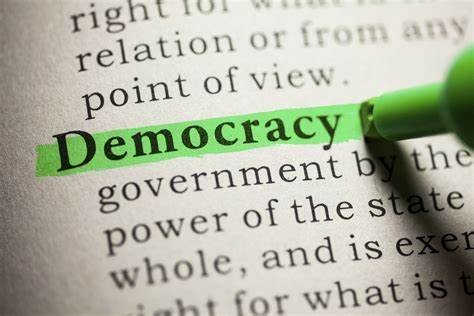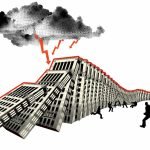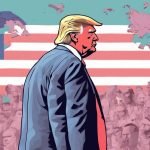
Reflections on Democracy: Lessons from Recent Political Events.
Posted in :
American democracy is at a crossroads—haunted by inequality, oligarchic influence, and political apathy. This piece explores its historical foundation, Trump’s legacy, and why a political revolution driven by the working class and youth is essential to restore power to the people.
The implications of recent political events in America, focusing on the challenges to democracy, the influence of economic inequality, and the need for a political revolution.
In a recent stirring address, a seasoned political figure discussed the state of American democracy, shedding light on how current events reflect past struggles. The speech was not just a recount of history but a passionate call to action, revealing the ongoing challenges faced by ordinary citizens.
The State of American Democracy: A Historical Lens
Founding Principles of Democracy
The principles of democracy in America were carefully crafted by the Founding Fathers. They envisioned a system where power rests with the people. This meant that every citizen should have a voice in governance. The ideals of liberty, equality, and justice were central to their vision. They believed in a government that serves the interests of the many, not just the few.
But what does this mean in practice? It means that every vote counts. It means that citizens should have access to information and the ability to participate in political processes. The Founding Fathers understood that democracy is not just a set of rules; it’s a living, breathing entity that requires constant nurturing.
The Trump Administration’s Impact
Fast forward to recent years, and the political landscape has shifted dramatically. The Trump administration brought forth decisions that many argue undermined democratic principles. From the handling of immigration policies to the response to protests, the administration’s actions sparked intense debate.
- Many critics argue that Trump’s presidency marked a troubling period for democracy.
- His approach often seemed to favor the wealthy, leading to claims of an oligarchic influence in governance.
- As one speaker noted, “We have a government of the billionaire class, by the billionaire class, and for the billionaire class.”
This sentiment reflects a growing concern among citizens. The idea that a small group of wealthy individuals can dictate policy raises questions about the integrity of democracy. Are we truly living in a government of the people, or has it become something else?
Historical Comparisons
To understand the current state of democracy, it’s essential to look back at pivotal moments in history. The Gettysburg Address, delivered by Abraham Lincoln, emphasized a government “of the people, by the people, for the people.” This powerful statement serves as a reminder of the core values of democracy.
Lincoln’s words resonate today. They challenge us to reflect on whether our current political system aligns with these ideals. Are we honoring the sacrifices made for democracy? Or are we straying from the path laid out by our forefathers?
Understanding Historical Context
Understanding the historical context is crucial in current political dialogues. The struggles of the past inform our present perspectives. For instance, the disenfranchisement of various communities has shaped political alignments. Many who once supported the Democratic Party now feel abandoned.
As the speaker at a recent rally pointed out, the Democratic Party must reconnect with the working class. The economic challenges faced by many Americans today echo those of the past. About 60% of Americans live paycheck to paycheck. This statistic highlights the ongoing struggle for economic stability.
The Evolving Nature of Democracy
Democracy is not static; it evolves. The challenges we face today, such as income inequality and the influence of money in politics, are significant. The Citizens United ruling has allowed for unprecedented campaign financing, leading to a system where the voices of the wealthy often drown out those of ordinary citizens.
As we navigate these challenges, it’s essential to remember that democracy requires active participation. Citizens must engage in the political process, advocate for their rights, and hold leaders accountable. Only then can we hope to create a government that truly reflects the will of the people.
In conclusion, the state of American democracy is a complex tapestry woven from historical threads. By examining the principles established by the Founding Fathers, the impact of recent political decisions, and the lessons from history, we can better understand the challenges we face today. The journey toward a more equitable democracy continues, and it is up to each of us to play our part.
Economic Inequality: The Elephant in the Room
Economic inequality is a pressing issue in America today. It’s a topic that often gets swept under the rug, yet it affects millions of lives. The divide between the wealthy and the working class is stark and growing. Statistics reveal that about 60% of Americans live paycheck to paycheck. This means that a significant portion of the population struggles to make ends meet, often living in a state of financial anxiety.
The Wealth Gap
To understand the depth of this issue, consider the following:
- The top 1% of earners hold more wealth than the bottom 90% combined.
- Wages for the average American worker have stagnated, while the cost of living continues to rise.
- Many families are forced to choose between basic necessities like food and housing.
These statistics paint a grim picture. They show a society where the rich get richer, while the working class struggles to survive. It’s not just numbers; it’s real people facing real challenges.
Anecdotes of Struggle
Take, for example, the story of a single mother working two jobs. She wakes up before dawn to prepare her children for school, then rushes to her first job. After a long day, she heads to her second job, often returning home late at night. Despite her hard work, she still finds it difficult to pay rent and buy groceries. This is not an isolated case. Many families share similar stories of hardship.
Another example is a family of four living in a small apartment. They rely on food banks to supplement their meals. They worry about unexpected expenses, like a car repair or a medical bill. These situations are becoming increasingly common in America. The struggle to make ends meet is a daily reality for many.
Living Paycheck to Paycheck
The significance of living paycheck to paycheck cannot be overstated. It creates a cycle of stress and uncertainty. Families are often one emergency away from financial disaster. This constant worry can lead to mental health issues, affecting not just individuals but entire communities.
As one political figure noted,
“Today the average American worker in real inflation accounted for dollars is earning less than he or she did 50 years ago.”
This statement highlights the stagnation of wages and the erosion of purchasing power. It raises the question: how can a society thrive when so many of its members are struggling?
Political Implications
The implications of economic inequality extend beyond individual struggles. They affect democracy itself. The Citizens United decision has allowed for unchecked campaign financing, enabling the wealthiest individuals to exert disproportionate influence over politics. This creates a system where the interests of the few overshadow the needs of the many.
Public sentiment towards economic disparities is shifting. More people are recognizing the need for change. There is a growing call for policies that support the working class, such as raising the minimum wage and expanding access to affordable housing. These changes are essential for creating a more equitable society.
In conclusion, economic inequality is not just an abstract concept. It is a reality that affects millions of Americans. The stories of families struggling to make ends meet serve as a reminder of the urgent need for change. As the divide between the wealthy and the working class continues to grow, it is crucial to address these issues head-on. Only then can we hope to build a more just and equitable society for all.
The Call for Political Revolution
In today’s political landscape, many voices are calling for a political revolution. This is not just a catchy phrase; it is a necessity for transformative change. The current system often favors the wealthy elite, leaving the working class and youth feeling disenfranchised. How can we expect a government to represent all its citizens when it is primarily influenced by a handful of billionaires?
The Necessity of a Political Revolution
To understand the need for a political revolution, one must look at the economic struggles faced by many Americans. Approximately 60% of Americans live paycheck to paycheck. This statistic is alarming. It highlights the urgent need for a system that prioritizes the needs of the many over the few. A political revolution aims to dismantle the oligarchic structures that have taken root in our governance.
As one prominent speaker noted, “
We need a government that works for all of us, not just the people on top.
” This sentiment resonates deeply with those who feel left behind. The current political climate, especially under the influence of figures like Donald Trump, has exacerbated these issues. The call for a revolution is not just about changing leaders; it’s about changing the system itself.
Engaging the Youth and Working Class
Engaging the youth and working class is crucial for a successful political revolution. These groups often feel disconnected from the political process. They may think their voices don’t matter. But they do. Mobilizing these demographics can lead to significant changes in policy and governance.
- Education: Young people need to understand the importance of their vote. Schools and communities should emphasize civic education.
- Grassroots Movements: Supporting local initiatives can empower individuals. When people see their efforts making a difference, they are more likely to engage.
- Social Media: Utilizing platforms to spread awareness can help reach younger audiences. It’s a powerful tool for mobilization.
By focusing on these strategies, we can inspire a new generation to care about democracy. They must see that their participation is vital for a fair and just society.
Public Funding of Elections
One of the cornerstones of a fair political system is public funding of elections. This proposal aims to reduce the influence of money in politics. Currently, campaign financing is often dominated by wealthy donors and corporations. This leads to policies that favor the rich, while the needs of the average citizen are overlooked.
Public funding can level the playing field. It allows candidates to focus on their constituents rather than on fundraising. Imagine a political landscape where candidates are accountable to the people, not to their donors. This is a vision worth striving for.
Successful Past Movements
History shows us that grassroots movements can transform political landscapes. For example, the civil rights movement brought about significant changes in legislation and social attitudes. Similarly, the labor movement fought for workers’ rights and better wages. These movements were driven by ordinary people demanding change.
Today, we can draw inspiration from these successes. The fight for a political revolution is not new. It is a continuation of the struggle for equality and justice. By learning from the past, we can mobilize effectively for the future.
In conclusion, the call for a political revolution is more than just a rallying cry. It is a necessary step towards a fairer society. Engaging the youth and working class, advocating for public funding of elections, and learning from past movements are all vital components of this journey. The time for change is now.
The Future of Foreign Policy in American Democracy
In today’s complex world, the intersection of domestic politics and foreign policy is more crucial than ever. The decisions made within the United States can have far-reaching effects on global stability. This is particularly evident in ongoing conflicts like those in Ukraine and Gaza. How do domestic political strategies shape these foreign policy decisions? And what are the implications for democracy?
Domestic Political Strategies and Foreign Policy
Domestic political strategies play a significant role in shaping foreign policy. Politicians often use international conflicts to rally support at home. For instance, the situation in Ukraine has become a rallying point for many leaders. They argue that supporting Ukraine is not just about international law; it’s about standing up for democratic values. This sentiment echoes the statement,
“We will stand with democracy and not with authoritarian people all over the world.”
In Gaza, the dynamics are different but equally complex. The U.S. has historically supported Israel, which can be seen as a reflection of domestic political pressures. Various interest groups advocate for different approaches, influencing how the U.S. engages in the region. This raises questions: Are these policies truly in line with democratic values? Or are they merely a reflection of political expediency?
Military Support to Foreign Allies
Another critical aspect of U.S. foreign policy is military support to allies. This support often comes under scrutiny. Critics argue that ongoing military aid can lead to unintended consequences. For example, in Ukraine, military assistance is seen as a necessary measure against Russian aggression. However, it also raises concerns about escalating tensions. Are we risking a larger conflict?
In Gaza, military support has been a contentious issue. Some argue that it enables ongoing violence, while others believe it is essential for Israel’s security. The debate continues: How much support is too much? And at what point does military aid conflict with the values of democracy and human rights?
Aligning Foreign Policies with Democratic Values
Aligning foreign policies with democratic values is essential for the credibility of the U.S. on the global stage. When policies appear to contradict these values, it undermines trust. For instance, the support for authoritarian regimes can lead to backlash. Citizens may question why their government supports leaders who violate human rights.
Public opinion plays a vital role in shaping these policies. Many Americans are concerned about military aid and its implications. They want to see a foreign policy that reflects their values. This is where the challenge lies. How can leaders balance domestic political pressures with the need for a principled foreign policy?
Consequences of Misguided Foreign Policy
The consequences of misguided foreign policy decisions can be severe. They can lead to loss of life, destabilization of regions, and a tarnished reputation for the U.S. abroad. Moreover, public opinion can shift dramatically if citizens feel their government is acting against their interests. This can lead to a lack of trust in political leaders and institutions.
As the political landscape evolves, the need for a coherent and principled foreign policy becomes more pressing. The challenge is to ensure that U.S. actions abroad reflect the democratic values that many Americans hold dear. This requires active engagement from citizens and a commitment to holding leaders accountable.
In conclusion, the future of foreign policy in American democracy hinges on the ability to navigate the complex interplay between domestic politics and international responsibilities. As conflicts like those in Ukraine and Gaza continue to unfold, the U.S. must strive to align its foreign policies with democratic values. Only then can it truly stand as a beacon of hope and democracy in a world often overshadowed by authoritarianism.
TL;DR: Key takeaways from the recent discussion on democracy include the urgency for political change, the dangers of oligarchy, and the necessity of supporting working-class interests over corporate greed.
Oligarchy, EconomicInequality, AmericanDemocracy, PublicFundingElections, Democracy, PoliticalRevolution, PoliticalCommentary, Trumpism,
#PublicFundingElections, #Democracy, #PoliticalRevolution, #PoliticalCommentary, #AmericanDemocracy, #Trumpism, #EconomicInequality, #Oligarchy,#AmericanDemocracy, #PoliticalReform, #TrumpEra, #EconomicInequality, #PublicFunding, #ForeignPolicy, #Oligarchy, #CivicEngagement, #YouthInPolitics, #WorkingClass

